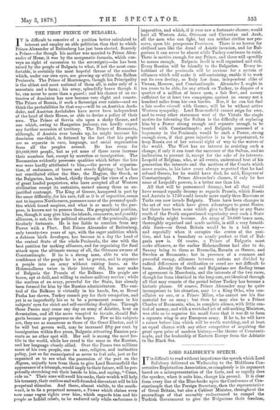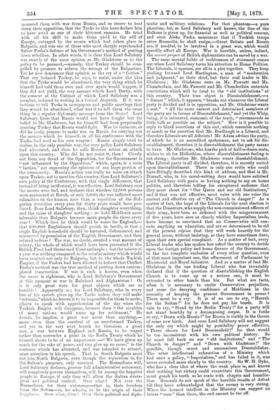LORD SALISBURY'S SPEECH.
IT is difficult to read without impatience the speech which Lord Salisbury delivered on Wednesday to the Middlesex Con- servative Registration Association, so completely is its argument based on a misrepresentation of the facts, and so rapidly does the speaker, when it suits him, change his ground. It is clear from every line of the Blue-books upon the Conference of Con- stantinople that the Foreign Secretary, then the representative of Great Britain, but also a Cabinet Minister, throughout the proceedings of that assembly endeavoured to compel the Turkish Government to give the Bulgarians their freedom,
menaced them with war from Russia, and so strove to beat down their opposition, that the Turks to this hour declare him to have acted as one of their bitterest enemies. He tried with all his skill to make them yield to the will of Europe, outraged by the scenes which had taken place in Bulgaria. and was one of those who most sharply reprehended Safvet Pasha's defence of his Government's method of putting down rebellion. In other words, it is clear that Lord Salisbury was exactly of the same opinion as Mr. Gladstone as to the policy to be pursued,—namely, that Turkey should be com- pelled by pressure to redress the wrongs of the Bulgarians.
Yet he now denounces that opinion as the cry of a " faction."
That cry induced Turkey, he says, to resist, under the idea that the Turks would be abandoned, the very thing which he himself had told them over and over again would happen, if they did not yield, the very menace which Lord Derby, with the consent of the Cabinet of which Lord Salisbury was a member, reduced to writing in a formal despatch. If it was factious to tell Turks in newspapers and public meetings that they would be abandoned, what was it to tell them the same thing in a regular diplomatic message from the State ? Lord Salisbury hints that Russia would not have fought but for belief in Mr. Gladstone, but he himself had been perpetually assuring Turkey that Russia would fight. Was he insincere, or did he really propose to make war on Russia for carrying out
the menace which he himself, in all his conferences with the Turks, had used as his own weapon ? Russia simply tried to realise, in the only possible way, the very policy Lord Salisbury had advocated, and then he calls Russian action an attack upon this country. Why did he not resist it, then ? Clearly not from any dread of the Opposition, for the Government is " not influenced by the Opposition," which, again, is a mere " faction,' not expressing the opinions of any large portion of the community. Russia's action was really no more an attack upon Turkey, not to mention this country, than Lord Salisbury's own policy at the Conference, with this single difference, that instead of being ineffectual, it was effective. Lord Salisbury says the means were bad, and declares that whether 12,000 persons were massacred at Batuk, or only 3,000, the war inflicted more calamities on the human race than a repetition of the Bul- garian atrocities every year for thirty years would have pro- duced. Does Lord Salisbury, then, think slaughter everything, and the cause of slaughter nothing ; or hold Middlesex more miserable than Bulgaria because more people die there every year ? Which does he think would be worse for England,— that 100,000 Englishmen should perish in battle, or that a single English household should be tortured, dishonoured, and massacred by permission of the English Government, and then refused redress ? The war, no doubt, created a vast amount of misery, the whole of which would have been prevented if the British Fleet had threatened Constantinople ; but the misery of a year was nothing compared to the secular misery which would have resulted not only to Bulgaria, but to the whole Turkish Empire, if the Pashas had been allowed to believe that Chefket Pasha's method was the true method of putting down contem- plated insurrection. If war is such a horror, even when the cause is righteous, why is Lord Salisbury's Government at this moment at war in Zululand and Afghanistan ? Or is it only great wars for great objects which are so horrible? Apparently so ; for Lord Salisbury, who in every line of his speech gives up the Turks unless they will make " reforms," which he knows it to be impossible for them to make, affects to speak with apprehension of the day when the Turkish Empire will disappear, because then "the rivalries of many nations would come up for settlement." He dreads, he implies, a great war more than anything,— more even than the survival of an unreformed Turkey, and yet in the very next breath he threatens a great war, a war between England and Russia, to be waged rather than surrender a point in the Berlin Treaty which he himself shows to be of no importance :—" We have given up much for the sake of peace, and can give up no more," is the sentence which has attracted, and was intended to attract, most attention in his speech. That is, South Bulgaria must not join North Bulgaria, even though the separation is, for the. Sultan's purposes, only nominal. The Roumelians will, Lord Salisbury declares, possess full administrative autonomy, will completely govern themselves, will be among the happiest people in Europe, if only they will allow the Sultan strate-
gical and political control. Over what? Not over the Roumelians, for their autonomy—that is, their freedom from the Sultan—is, he admits, to be the origin of their happiness. Over what, then ? Over their political and diplo- matic and military relations. For that phantom—a pure phantom, for, as Lord Salisbury well knows, the line of the Balkans is given up, for financial as well as political reasons, and even Aleko Pasha announces that if Turkish troops enter Roumelia, he shall resign,—Great Britain and Russia are, if needful, to be involved in a great war, which would speedily affect all Europe. War is horrible, unless, indeed, the amour propre of British diplomatists can be saved by a war.
The same mental foible of recklessness of statement comes out when Lord Salisbury turns his attention to Home Politics. The Liberals, it appears, are all in a plot together. They keep pushing forward Lord Hartington, a man of "moderation and judgment," as their chief, but their real leader is Mr. Gladstone ; Mr. Gladstone rests on Mr. Fawcett and Mr. Chamberlain, and Mr. Fawcett and Mr. Chamberlain entertain convictions which will be fatal to the "old institutions" of this country. Their true object is Disestablishment,—a " disease " which, it appears, " breaks out whenever the Liberal party is divided and is in opposition, and Mr. Gladstone wants a seat." " All the more earnest and determined members of the party are in favour of Disestablishment," and yet the Whip, being, it is intimated, economic of the truth, " recommends as little talk as possible on the subject." How is it possible to reply to blank assertions of this sort, which resemble nothing so much as the assertion that Mr. Bradlaugh is a Liberal, and therefore Liberals are all Atheists? Mr. Adam advises the party, of which he is an accredited spokesman, not to ask for dis- establishment, therefore it is disestablishment the party means to have. Mr. Gladstone, who has the pick of half-a-dozen seats, wishes to sit for Midlothian, where disestablishment feeling is not strong ; therefore Mr. Gladstone wants disestablishment. The Liberal party is all divided, therefore, it is secretly united upon disestablishment. There is only one critic who could have fittingly described this kind of address, and that is Mr. Disraeli, who, in his novel-writing days would have satirised Lord Salisbury with gusto as having nothing to say on home politics, and therefore telling his enraptured audience that they must shout for " Our Queen and our old Institutions," and if that was not effective, must raise with one voice the ancient and effective cry of "The Church in danger !" As a matter of fact, the hope of the Liberals for the next election is that the Dissenters, who supply the non-commissioned officers of their army, have been so sickened with the misgovernment of five years, have seen so clearly whither Imperialism leads, have become so convinced that no Conservative will con- cede anything on education, and are so determined to be rid of the present regime that they will work heartily for the general cause, without insisting, as they have sometimes done, upon their own special complaint. As a matter of fact, every Liberal leader who has spoken has asked the country to decide upon the foreign policy and home finance of the Government, to the too complete exclusion of every other question, even of that most important one, the effacement of Parliament by Ministerial and Royal initiative. And as a matter of fact Mr. Gladstone is the one leading Liberal who has invariably declared that if the question of disestablishing the English Church is to come up as a serious one, it must be entrusted to other hands than his. But what are facts, when it is necessary to excite Conservative prejudices, and rouse the decaying confidence of Middlesex in the necessity of keeping the present Government in power ? There must be a cry. It is of no use to cry, "Hurrah for the Sultan !" for he does not pay his bonds. It is vain to cry, " Stand by the Berlin Treaty !" for a party will not stand heartily by a decomposing corpse. It is futile to cry, " Down with Russia !" for Russia is visibly in the throes of some new birth. And even Lord Salisbury will not suggest the only cry which might by possibility prove effective, " Three cheers for Lord Beaconsfield I" for that would be too inconsistent with his own political history. So he must fall back on our " old institutions," and " The Church in danger !" and " Down with Gladstone!" the possible, though secret and unconscious Disestablisher. The utter intellectual exhaustion of a Ministry which had once a policy, " Imperialism," and has failed in it, was never revealed more clearly to the country. Sir W. H. Dyke, who has a clear idea of where the weak place is, and knows that nothing but victory could resuscitate this Government, must gnash his teeth as he reads with chagrin and humilia- tion. Generals do not speak of the horrible results of defeat till they have acknowledged that the enemy is very strong. When the keenest intellect in the Ministry can suggest no better " cues" than these, the end cannot be far off.



































 Previous page
Previous page